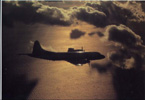ChezDaJez
Posts: 3436
Joined: 11/12/2004
From: Chehalis, WA
Status: offline

|
quote:
The idea of removing the Zero bonus and replacing it with reduced Allied pilot experience levels came about because of the fact that the Zero was not the only maneuverable Japanese aircraft at the start of the war, so it doesn't make sense that ONLY the Zero gets the bonus. I think the discussion actually was about the Oscar I.
One problem with reducing Allied experience is that it effects combat vs bombers as well as vs fighters, so it is perhaps too broad. But in my view the Zero bonus is too narrow. I also think that the bonus may apply for too long, but without eliminating it in the way I propose there is nothing that can be done about that.
Hi, Andrew.
I don't favor removing the Zero bonus in general becuase IMO opinion it reflects the "mental shock" experienced by the allies that Japan could field such a capable long-range fighter. And it wasn't just the maneuverability. Range was definitely a factor also. Historical accounts often relate the shock allied forces had at seeing the Zero appear in places it shouldn't have been able to reach by Allied thinking at the time. This is one reason why I don't support adding the Oscar but I probably wouldn't oppose it either.
Plus the bonus is gone by May 42 which is before Coral Sea. So by the time the major historical carrier battles were fought, the Zero was well known to the allies and while it was still highly respected, the "fear" factor had pretty much gone. Once the Allies figured out its weaknesses and developed the tactics to fight it, it became just another plane to be fought.
Trying to adjust experience levels would have huge game wide effects and last much longer than the Zero bonus does.
Decreasing Allied experience across the board would also affect some units that should be left alone. This would have to be done on a case by case basis. Brit pilots shouldn't have their experience levels decreased simply due to their experiences gained from over years of war. USN pilots were probably second only to Brit pilots at the start.
Going the opposite route and increasing Japanese experience would be devastating and would last far longer than the intended effects should.
One area I feel does need adjusting is the Japanese trained pilot pool. Where the designers came up with 20 IJAF and 10 IJN pilots a year, I'll never know. I assume it was for play balance as it doesn't even come close to keeping up with ops losses let alone combat losses nor reflect RL numbers.
IRL the IJA accepted about 2500 applicants a year into pilot training (pre-war). As the training was very intensive, only about 800-900 pilots actually completed the training. If you assume that about 2/3-3/4 of them were sent to combat units means that about 45-50 pilots a month should be available for assignment.
The IJN accepted approximately 1200 pilots a year for training of which about 400-450 completed it. Again assuming a maximum of 75% being assigned to a combat unit yields about 25-30 IJN pilots a month for assignment.
Now the training numbers flucutate depending upon what source you read (and there aren't that many that discuss IJ pilot training) but the above numbers represent an "average" of the sources I have.
Anyways, just my thoughts on the issues.
CHez
_____________________________
Ret Navy AWCS (1972-1998)
VP-5, Jacksonville, Fl 1973-78
ASW Ops Center, Rota, Spain 1978-81
VP-40, Mt View, Ca 1981-87
Patrol Wing 10, Mt View, CA 1987-90
ASW Ops Center, Adak, Ak 1990-92
NRD Seattle 1992-96
VP-46, Whidbey Isl, Wa 1996-98
|
 Printable Version
Printable Version












 ]
]











 New Messages
New Messages No New Messages
No New Messages Hot Topic w/ New Messages
Hot Topic w/ New Messages Hot Topic w/o New Messages
Hot Topic w/o New Messages Locked w/ New Messages
Locked w/ New Messages Locked w/o New Messages
Locked w/o New Messages Post New Thread
Post New Thread